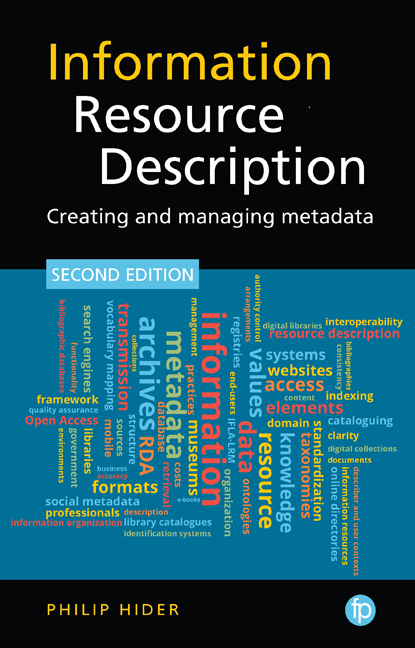Book contents
- Frontmatter
- Dedication
- Contents
- List of figures and tables
- Preface to the First Edition
- Preface to the Second Edition
- List of abbreviations
- 1 Definitions and scope
- 2 Information resource attributes
- 3 Tools and systems
- 4 Metadata sources
- 5 Metadata quality
- 6 Sharing metadata
- 7 Metadata standards
- 8 Vocabularies
- 9 The future of metadata
- Further reading
- List of metadata standards
- Index
9 - The future of metadata
Published online by Cambridge University Press: 24 September 2019
- Frontmatter
- Dedication
- Contents
- List of figures and tables
- Preface to the First Edition
- Preface to the Second Edition
- List of abbreviations
- 1 Definitions and scope
- 2 Information resource attributes
- 3 Tools and systems
- 4 Metadata sources
- 5 Metadata quality
- 6 Sharing metadata
- 7 Metadata standards
- 8 Vocabularies
- 9 The future of metadata
- Further reading
- List of metadata standards
- Index
Summary
Introduction
It is clear that people will make use of metadata to find, identify, select, obtain and explore information resources for a long time to come. When we consider the future of metadata, then, the question is not whether there is a future but what that future might look like. There are several aspects to this question, associated with the various aspects of metadata which we have discussed in the preceding chapters. To what extent will metadata be used in future information retrieval systems, given the rise of content-based retrieval? What kind of metadata will be needed in future information environments? Who will be creating and managing this metadata? What value will we place on it? How will metadata be shared across systems? Will metadata become more, or less, standardised? All these questions are interrelated, of course, and can be answered only by considering the future of the information environment as a whole.
Three approaches to information access provision
In today's online world, access to information resources can be provided by taking one or more of three general approaches. First, there is the approach which bypasses metadata altogether and uses computers to analyse the content of information resources to retrieve those most likely to be relevant to users’ needs. Second, there is the Web 2.0 approach, in which end-users, contributors and authors provide the metadata. Third, there is the traditional approach, in which resources are organised and described by information professionals in the ways that they deem most effective for their clients. We can address the questions posed above by examining the prospects for each of these approaches.
Ultimately, approaches to information retrieval reflect different perspectives on the nature of information resources themselves. In the first chapter we observed that every information resource contains a message. This can be viewed objectively, that is, as something independent of everything else, and thus analysed by a third party without reference to either creator or recipient. Although the third party could be a person, such as an information professional, this perspective is most clearly adopted by content-based automated retrieval systems. Alternatively, the message can be viewed and analysed according to the meaning intended (or thought to be intended) by its creator. This perspective is reflected in metadata supplied by authors and publishers (on behalf of their authors).
- Type
- Chapter
- Information
- Information Resource DescriptionCreating and Managing Metadata, pp. 215 - 238Publisher: FacetPrint publication year: 2018



